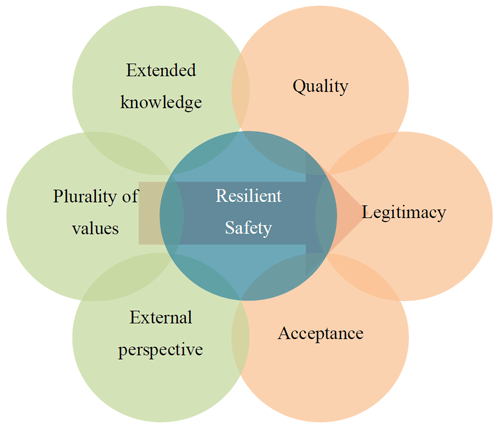Extended peer reviews for resilient safety
In reviews, the content of a scientific or science-based document is assessed by invited experts. Classical peer reviews are carried out by experts who belong to the same specialist community as the experts whose work is being reviewed. Performing peer reviews is an essential element of the publishing process for articles in scientific journals. This established practice aims at ensuring scientific quality and at fostering scientific discourse. Reviews can also be carried out on a science-based safety case. International experience already exists with peer reviews of safety cases. Such peer reviews can be initiated by the implementer, the regulator, or political bodies that issue a mandate to invited experts. The aim of a peer review is to examine and, if necessary, improve the quality of a safety case, which can also strengthen the credibility of the safety case in the eyes of various actors, including practitioners in waste management and scientists, but also the interested public.
Classical peer reviews have long been viewed critically in academic science. In view of complex issues, pluralistic values, and unpredictable developments, it is argued that it is appropriate to involve non-scientific peers in the review of documents on socially relevant issues. This gave rise to the idea of “extended peer-reviews” (Funtowicz and Ravetz, 1993), or, more precisely, reviews in an extended peer community, which can also be applied to reviews of safety cases. In the research project TRANSENS (Transdisciplinary research on the management of high-level radioactive waste in Germany), such extended peer reviews are placed in the context of transdisciplinary methods and tools. Our research indicates that extending the concept of peer reviews by involving various types of actors and using transdisciplinary methods and tools, so-called Td reviews, has the potential to improve the quality, legitimacy, and acceptance of a safety case and is suitable for contributing to a participatory, science-based, transparent, self-questioning, and learning site-selection procedure in the sense of the Site Selection Act (Eckhardt et al., 2023).
Resilient safety is based on the ability to adapt to and recover from damaging impacts. The socio-technical system of radioactive waste management should be able to quickly return to a safe state in the event of a disruption. With Td reviews, further bodies of knowledge are introduced into the safety case, different perceptions and values, and an external perspective, which is not biased in the same way as that of peers in the classical and narrower senses. Thus, the quality, legitimacy, and acceptance of the safety case can be strengthened, and Td reviews are expected to have a positive impact on the resilience of the safety case and on the repository planning and optimization associated with the safety case (Eckhardt et al., 2023). So far, the systematic implementation of peer reviews has not been legally anchored in Germany, and experience with such processes is limited (Röhlig and Sträter, 2022). Therefore, there is a good chance at present of involving – initially on an experimental basis – not only peers, but also an extended peer community in the review of upcoming safety cases.






